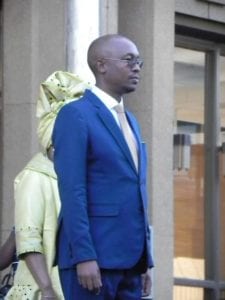The City of Johannesburg’s State of the City Address 2015 was delivered by Executive Mayor Mpho Parks Tau on 6 March at the Council Chambers in Braamfontein. The theme of the speech was a quote from former president Thabo Mbeki: “We must ensure that today is better than yesterday and that tomorrow will be better than today. Tau stated that the City of Johannesburg accepts this responsibility and mandate with pride and that it is “a city that knows it must turn its challenges into opportunities. That understands its destiny is determined by its capacity to innovate in order to transform.”
The city’s youth as an asset
In his speech, Tau emphasized the importance of treating the youth as an asset rather than a challenge because “the young lead the call for transformation.” He said that the Mayoral Committee had recently approved a partnership with Harambee Youth Accelerator to drive the first year of the Vulindlel’ eJozi as an innovative response to the staggering issue of youth unemployment. This programme will work with the already-established Jozi@Work programme which aims to transform the challenges of unemployment and service delivery backlogs.Smart Cities
Internet access is becoming a human rights issue. Says Tau, “the broadband network that we have developed is a public asset.” To this end, Braamfontein in in the process of being blanketed with Wi-Fi to provide the multitude of students in the area with a means to access opportunity and education. Along with this, the City has already implemented and plans to upgrade and expand its security reach with the use of CCTV cameras and intelligent predictive software to make the city safer with innovative technology.Blue Economy
“Being a smart city is not only about the clever use of technology, it is also about using smart innovation to solve complex problems.”The city has been working with Prof Gunter Pauli, author of “The Blue Economy” to figure out ways to create a society that moves from scarcity to abundance with what is locally available. One of the blue economy projects of the city address the issue of water scarcity. Tau said: “We live in a water scarce country and unless we change our behaviour, we will experience pressure on the supply side. We have invested in recent years extensively in maintenance to prevent unaccounted for water in the City. This has enabled us to maintain reliability of water supply. We have maintained the same water reserve margin for several years, despite our increasing population. However unless we change our behaviour, demand will outstrip supply. To confront this, the City will incentivize and regulate the installation of low-flush toilets and water-saving urinals as a standard feature in Joburg homes, offices and commercial sites.The mayor also announced that the city would be harnessing energy from bulk water pipe lines, “Given the energy constraints we face, we will be harnessing energy from the water flowing through our pipe system citywide using in-pipe turbines.” With regards to waste management, he stated that COJ would be “taking advantage of the opportunities presented by our investments in waste separation, we will be diverting organic waste to bio-digesters in order to harvest gas for fuel and energy, adding material from the sewerage system.”
Eco-mobility Festival
Throughout October 2015, the city will promote eco-mobile solutions for travel in the highly conjested area of Sandton. Tau said, “this will be a showcase of how transport in Sandton will be reconfigured, including Rea Vaya and the new cycle lanes we are currently investing in. This will increase the number of people who can enter and leave at any given time and therefore increase the footfall in the area.Transforming service delivery
The mayor said that “As we evolve the way we run basic services into a new, more effective network of systems for managing water, waste and energy it contributes to service delivery improvement more generally.” “By investing in innovation through smart meters over several years, Joburg is now able to dramatically reduce the extent of load shedding through our new load limiting system. This allows business and everyday homeowners to reduce their own electricity usage in order to avoid the rolling blackouts of load shedding.At 200 megawatts, Kelvin power station can provide about 7 % of the City’s needs. We are engaging with the private sector to secure investment in Kelvin to push its capacity to at least 600 megawatts.” Combining these innovations with electricity generated by users, through solar panels and other technology, plus ripple control – which allows the city to manage power usage in specific areas — the City can reduce power from the grid by 25 %, without blackouts from any City Power areas. The mayor announced that in the last year (2014) the City has:
- built 1 000 quality social housing and rentals places
- resurfaced 323 km of roads
- upgraded 44 km of gravel roads to surfaced roads.






